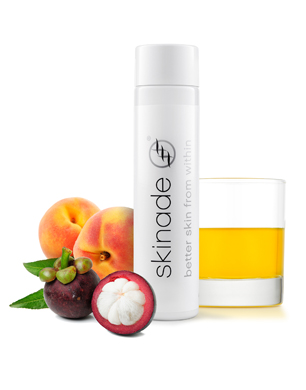 Collagen is hot news right now, with everything from capsules to gin – yes, gin, or Collagin, if you will – claiming to bump up your levels. And no wonder – collagen is the stuff that’s responsible for the plump, moist skin we have when we’re young, and our ability to produce it depletes with alarming rapidity after the age of 20 – by about 1% per year – and that’s even without the ruinous effects of smoking, drinking, inadequate sleep, poor nutrition and pollution.
Collagen is hot news right now, with everything from capsules to gin – yes, gin, or Collagin, if you will – claiming to bump up your levels. And no wonder – collagen is the stuff that’s responsible for the plump, moist skin we have when we’re young, and our ability to produce it depletes with alarming rapidity after the age of 20 – by about 1% per year – and that’s even without the ruinous effects of smoking, drinking, inadequate sleep, poor nutrition and pollution.
As a protein in our skin, collagen provides volume and keeps fine lines at bay; it’s also rich in amino acids needed for the repair and maintenance of tendons and joints. As we age, however, our bodies simply can’t replace it as quickly as we break it down – meaning that Collagin might be a worthwhile purchase, if only for drowning our sorrows!
Injectables are one way of getting the substance back in there where we want it, but it comes with the risk of unsightly bruising; there are also concerns about how long the effects last in relation to the cost. Creams and serums containing collagen are another option, but our skin simply doesn’t absorb it in sufficient amounts to really make a difference.
So could ingesting it be the solution? Could taking a daily dose of collagen get the substance into your system, allowing it to spread throughout and work its scaffolding magic?
Granted, there is plenty of scepticism around the idea of ingestible collagen, including the claim that the stomach’s acids would break the protein down before it could achieve anything of a rebuilding nature. Still, I’m neither scientist nor sceptic, and am more than willing to give things a go on the basis that they can’t harm and will possibly help. I mean, why not? Added to which, we had one of the hottest summers ever, which not only caused skin to be more dehydrated, but also increased pollution levels, which further damages skin.
According to expert Dr Melvyn Patterson, a cosmetic doctor at Woodford Medical Clinics,
“If you damage skin, it goes into repair mode and excites enzymes which re-adsorb damaged collagen. When you have too much chronic inflammation, these enzymes remove more collagen than your skin can create. This produces skin laxity and that’s where fine lines and wrinkles come in.”
Enter Skinade: a liquid collagen supplement. Quaffing, rather than eating, my collagen was aimed at providing a more digestible form of the protein, which wouldn’t need to be broken down and therefore, perhaps, compromised. There’s a whopping 7000 mg of the stuff in each sleek bottle, which is comparable to taking about 20 standard pills, so there’s some time and gagging to be saved, for starters. On top of that, it tastes quite nice – it’s got a hint of stone fruit about it and, at fewer than 38 calories per bottle, it’s pleasantly sweet, but not sickly – and it’s claimed that the drink has a trifold effect, not only increasing collagen in the bloodstream by way of the daily mega-dose, but also triggering the body’s own production of both collagen and hyaluronic acid, which is essential for hydration.
So did it work? You bet it did. My lightbulb moment came about unexpectedly, actually – I was washing my face and suddenly became aware of a springiness under my finger tips; my skin just felt firmer and ‘bouncier.’ Naturally, I bobbed my head up from the sink and peered intently into the mirror – and yes, the pigmentation and dark spots that I’d developed post-pregnancy (thanks, hormones) had faded significantly, and the hollow areas under my eyes were fuller. Over the coming weeks, I noticed that I didn’t feel self-conscious without makeup, since my skin tone was more even – and, as the final tick in the box of efficacy, a social media follower commented on a photo – “You are ageing backwards!” Safe to say that Skinade has now earned its place in my morning routine – as far as I’m concerned, it’s right up there with coffee and teeth-brushing.
Developed by UK scientists and manufactured in Britain, Skinade is currently available in 1,000 stockists nationwide as well as on www.skinade.com. It’s sold in courses of 150ml bottle 30 (£105), 60 (£210) and 90 (£315) days and is also available in a 15ml travel sachet, which you simply dilute in water.

